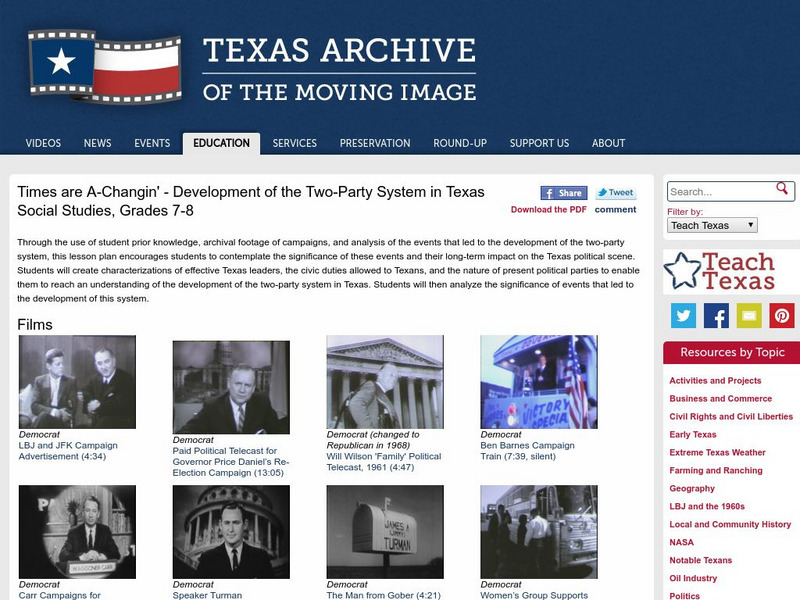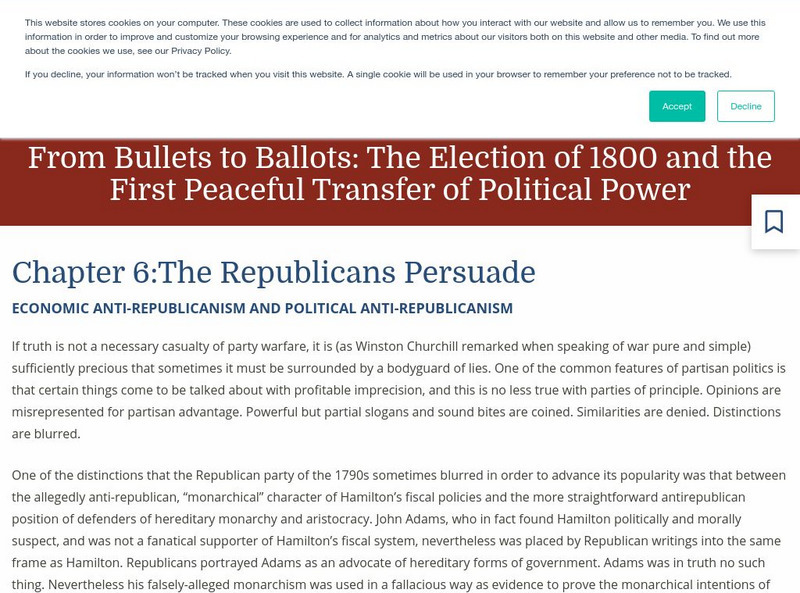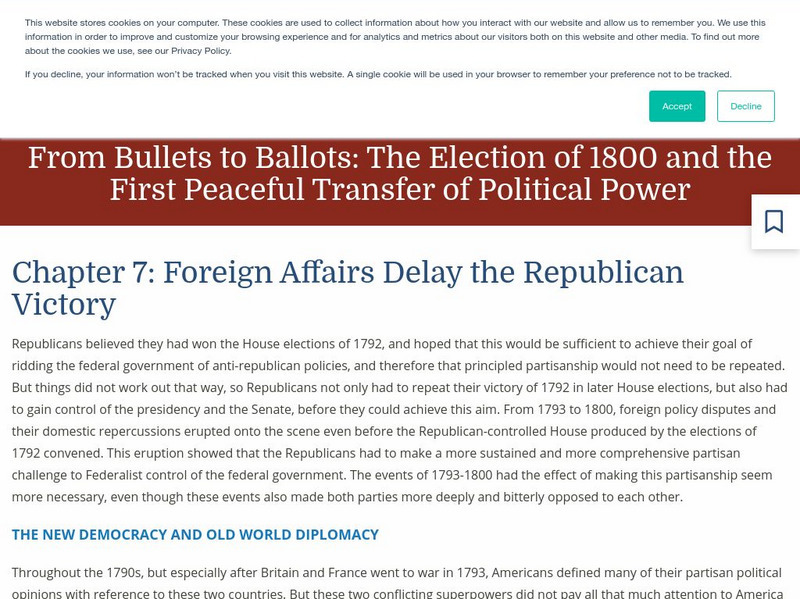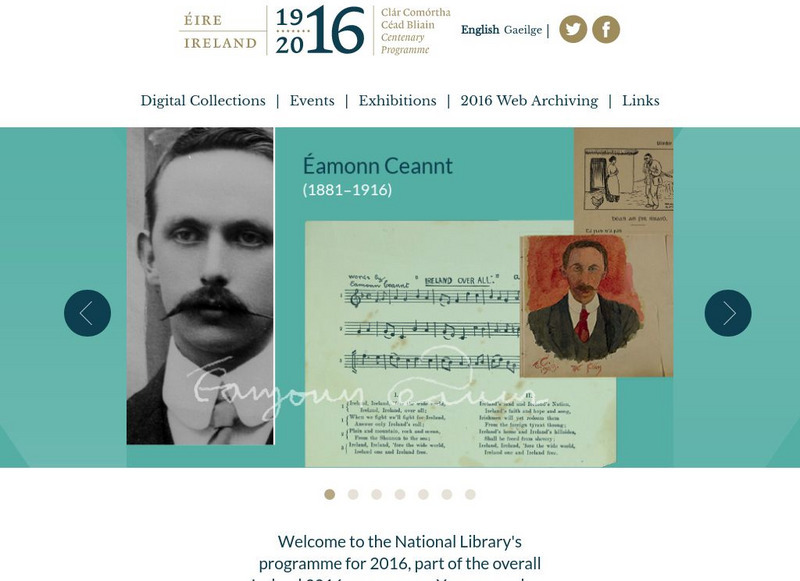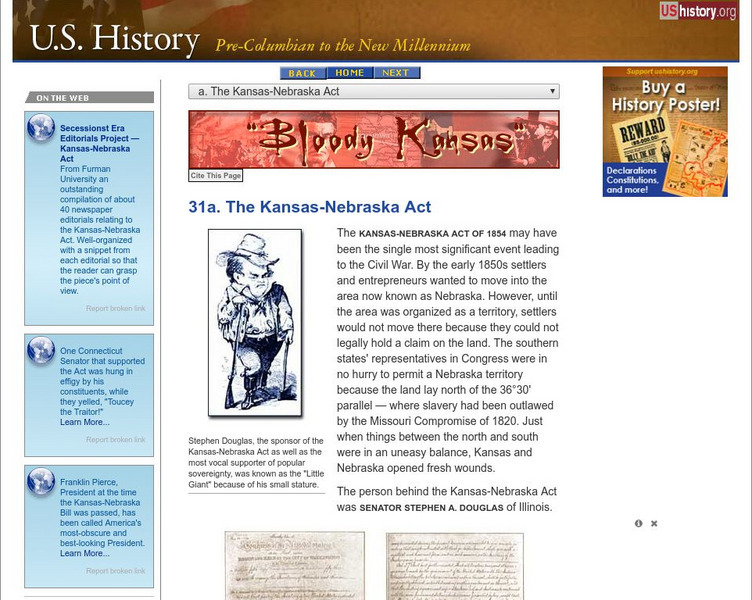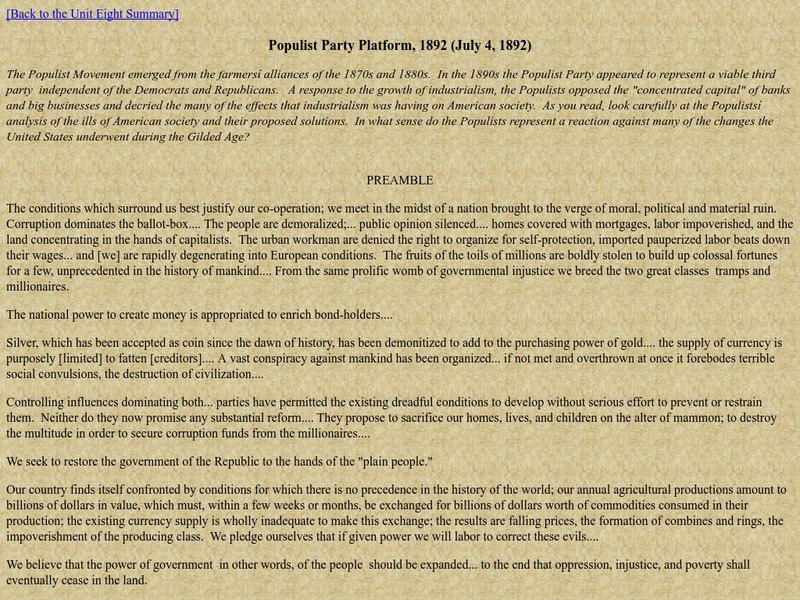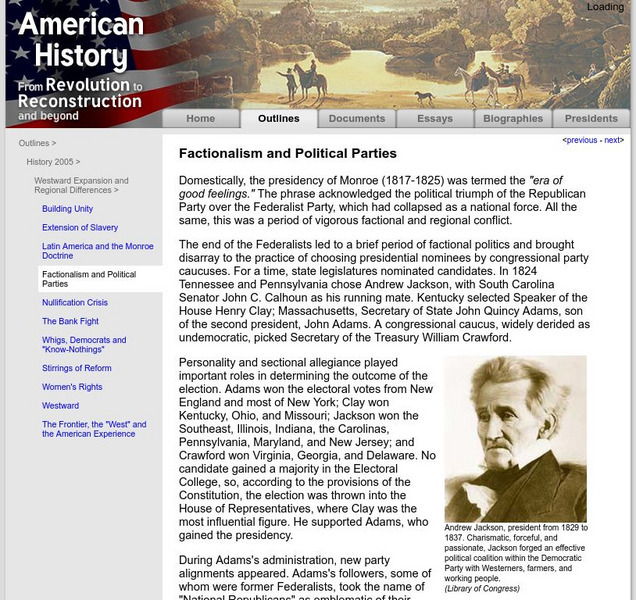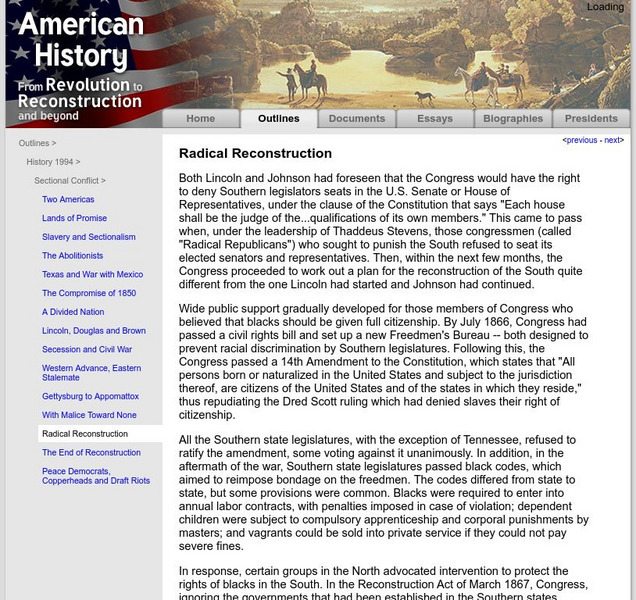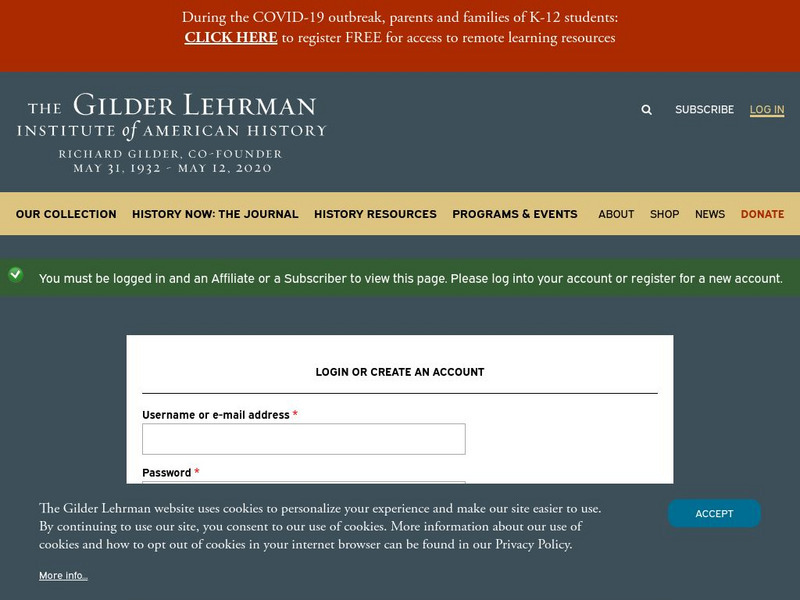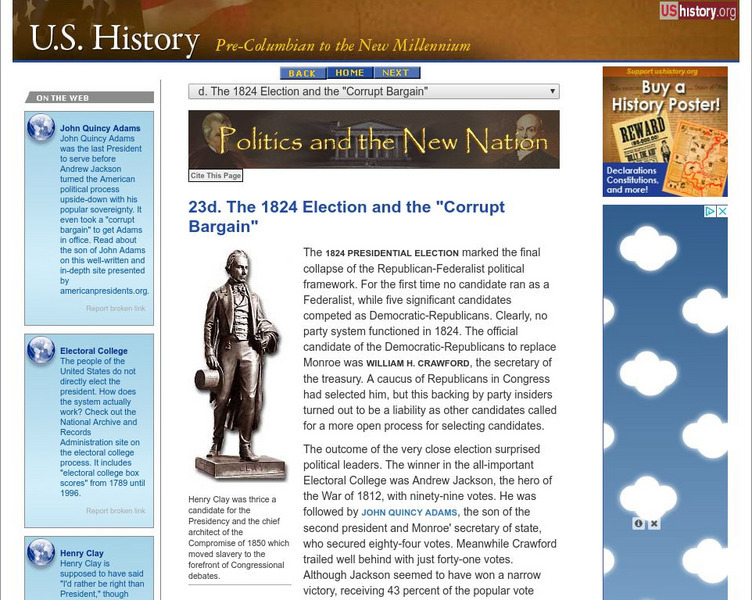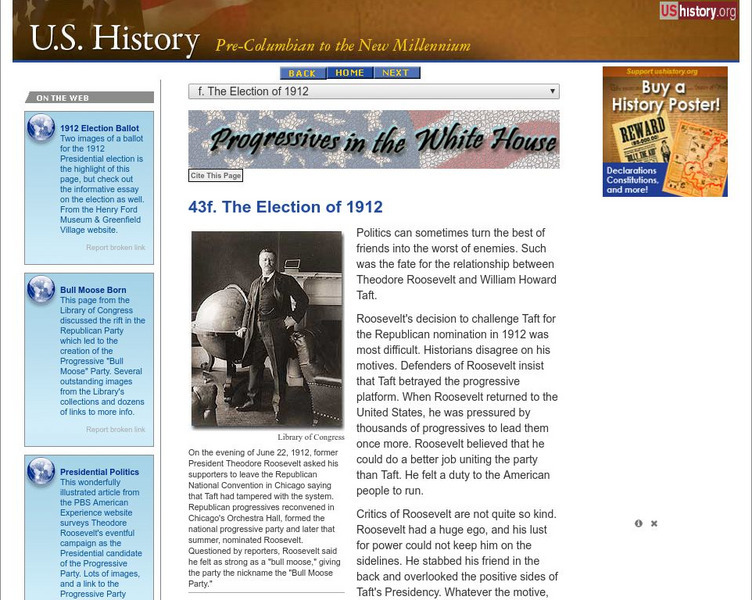Hi, what do you want to do?
Other
A Brief History of the Two Party System
This site is a web-article on the brief history of the two party system.
Library of Congress
Loc: Today in History: June 22: Houdini & Bull Moose Born
Read here to learn about the 1912 break in the Republican party that led Teddy Roosevelt to establish the Progressive, or Bull Moose, party and learn about Houdini and the historical events of June 22.
CNN
Cnn: Democratic Party History
CNN provides a brief account of Democratic party history from the party's origins in the Democratic-Republican party to the present, including information on the era preceding the Civil War.
Khan Academy
Khan Academy: Ap Us History History Unit: Period 7: 1890 1945: Teddy Roosevelt
The study resource from Khan Academy provides an overview of Period 7: 1890-1945 in American History. The Presidency of Theodore Roosevelt is discussed in this lesson. This resource is designed as a review for the AP US History Test.
OpenStax
Open Stax: Competing Visions: Federalists and Democratic Republicans
After reading this section of a chapter on "The New Republic," students will be able to describe the competing visions of the Federalists and the Democratic-Republicans, identify the protections granted to citizens under the Bill of...
Ohio History Central
Ohio History Central: Radical Republicans
A good description of the beginnings of the Republican Party before the Civil War, and the transformation to Radical Republicanism during Reconstruction as they attempted to guarantee equal rights for African Americans. Information is...
Other
Tami: Times Are a Changin' Development of the Two Party System in Texas
A collection of historical videos of political campaigns in Texas, which students analyze after an exploration of what qualities an effective political leader should have. They explore and discuss what Democrats and Republicans say in...
Teaching American History
Teaching American History: From Bullets to Ballots Chapter 6
Zvesper's book, From Bullet to Ballots, Chapter 6 introduces what anti-republicans looked like in the early days of the U.S. government. How did republicans differ from anti-republicans? What were representatives of each group?
Teaching American History
Teaching American History: From Bullets to Ballots Chapter 5
Alexander Hamilton's influences in politics among citizens seemed to create frustration with those who agreed with the philosophies of Thomas Jefferson and James Madison. The Republicans begin organizing themselves.
Teaching American History
Teaching American History: From Bullets to Ballots Chapter 7
The Republicans did not conquer their first election in the House in the 1792 election. Foreign affairs of the United States with both France and England hindered the success of the Republicans. This is explained in Chapter 7 from...
US Department of State
Bureau of International Information Programs: History Outline: Sectionalism
Article reviews several conditions of American society that sowed the seeds of civil war, particularly slavery and sectional conflict.
Other
National Library of Ireland: The 1916 Rising: Personalities and Perspectives
Online exhibition draws on the collections of the National Library of Ireland to tell the story of Easter week 1916, when seven Irishmen proclaimed themselves the provisional government of the Republic of Ireland and attempted to throw...
Independence Hall Association
U.s. History: The Kansas Nebraska Act
Read about the essential repeal of the Missouri Compromise, which had established which states could be slave and which would be free for thirty years, with the rancorous passage of the Kansas-Nebraska Act. See who supported it and why,...
Other
Fieldston School United States History Survey: Populist Party Platform
Text of the Populist Party platform in the election of 1892. You will be surprised to see how many resolutions were eventually adopted by Democrats and Republicans.
University of Groningen
American History: Outlines: Factionalism and Political Parties
Find out about the rise of regionalism and factionalism in the development of political parties involved in the elections of 1824 and 1828.
University of Groningen
American History: Outlines: Radical Reconstruction
During this period of American history, the presidents were in agreement, but the Republican party had some differences. This resource provides an explanation of those differences.
University of Maryland
University of Maryland: Republican China (1915 1928)
The history of China during the time just before and just after World War I.
Gilder Lehrman Institute of American History
Gilder Lehrman Institute: History Now: Lincoln at Cooper Union
[Free Registration/Login Required] An essay about Lincoln's speech in 1860 at Cooper Union which brought him to the attention of the national Republican Party.
University of Groningen
American History: Essays: The American Whig Party (1834 1856)
This article presents the second part of the history of the Whig Party to find out why the issue of slavery brought about its demise.
Siteseen
Siteseen: Government and Constitution: Free Soil Party
This article contains an overview of the history of the Free Soil Party, its leaders, their beliefs, and eventually joined with the National Union Party to form the newly formed Republican Party in 1854.
Khan Academy
Khan Academy: The Election of 1800
This Khan Academy resource provides and overview of the issues surrounding the Election of 1800.
Independence Hall Association
U.s. History: The 1824 Election and the "Corrupt Bargain"
The two-party system in presidential elections fell apart in the election of 1824. See what happened when five men, all from the Democratic-Republican Party, ran against each other. Find out why the choice of John Quincy Adams was called...
Independence Hall Association
U.s. History: The Election of 1912
William Howard Taft was a disappointment to the progressive-minded Theodore Roosevelt. Read about how he tried to be the Republican Party candidate in 1912, and when that failed, he started a third party, the platform of which was filled...
Ohio State University
E History: Ballinger Pinchot Controversy
A brief, but thorough, explanation of the controversy and antagonism between Gifford Pinchot and Richard Ballinger concerning conservation and the government's role in protecting public land. Read how this issue caused a rift in the...











